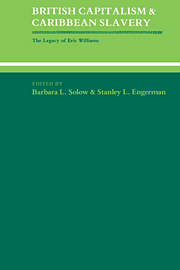Book contents
- Frontmatter
- Contents
- List of Contributors
- Preface
- British Capitalism and Caribbean Slavery: The Legacy of Eric Williams: An Introduction
- Part I Slavery as an Economic Phenomenon
- Part II Caribbean Slavery and the Industrial Revolution
- Part III The Decline of the British West Indies
- Part IV The Basis of Abolition and Emancipation
- Part V Capitalism and Slavery in Historical Perspective
- Capitalism and Slavery on the Islands: A Lesson from the Mainland
- “The Williams Effect”: Eric Williams's Capitalism and Slavery and the Growth of West Indian Political Economy
“The Williams Effect”: Eric Williams's Capitalism and Slavery and the Growth of West Indian Political Economy
Published online by Cambridge University Press: 15 December 2009
- Frontmatter
- Contents
- List of Contributors
- Preface
- British Capitalism and Caribbean Slavery: The Legacy of Eric Williams: An Introduction
- Part I Slavery as an Economic Phenomenon
- Part II Caribbean Slavery and the Industrial Revolution
- Part III The Decline of the British West Indies
- Part IV The Basis of Abolition and Emancipation
- Part V Capitalism and Slavery in Historical Perspective
- Capitalism and Slavery on the Islands: A Lesson from the Mainland
- “The Williams Effect”: Eric Williams's Capitalism and Slavery and the Growth of West Indian Political Economy
Summary
In spite of persistent and penetrative criticisms of Eric Williams's Capitalism and Slavery in the past four decades, the book has continued to exert an overwhelming intellectual influence over scholars researching the Caribbean dimension of colonial American political economy. In the main, criticisms have come from European and American scholars, but the work survives with an almost unblemished reputation among most Caribbean-based historians. The refusal of these historians to formulate lengthy and substantial criticisms of this work, though some Marxists have made minor theoretical critiques, results from a deep-rooted acceptance of, if not admiration for, its research quality and theoretical incisiveness. Recently, a regional economic historian has attempted to protect and defend this work from one of its most formidable opponents, and by doing this, he spoke, no doubt, for many of his colleagues. This fundamental academic respect that Capitalism and Slavery enjoys within the Caribbean has brought scholars, not only in historical studies but also within the disciplines of economics and political science, under its considerable influence. G. K. Lewis, the Caribbean's leading and most prolific political-intellectual historian, noted that “it is testimony to the essential correctness of that thesis that the attempt of a later scholarship to impugn it has been unsuccessful.” But nowhere outside of the historical field is this influence more evident than in the development of West Indian political economy.
- Type
- Chapter
- Information
- British Capitalism and Caribbean SlaveryThe Legacy of Eric Williams, pp. 303 - 316Publisher: Cambridge University PressPrint publication year: 1988
- 1
- Cited by



